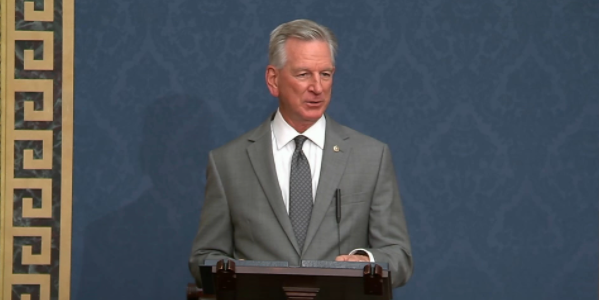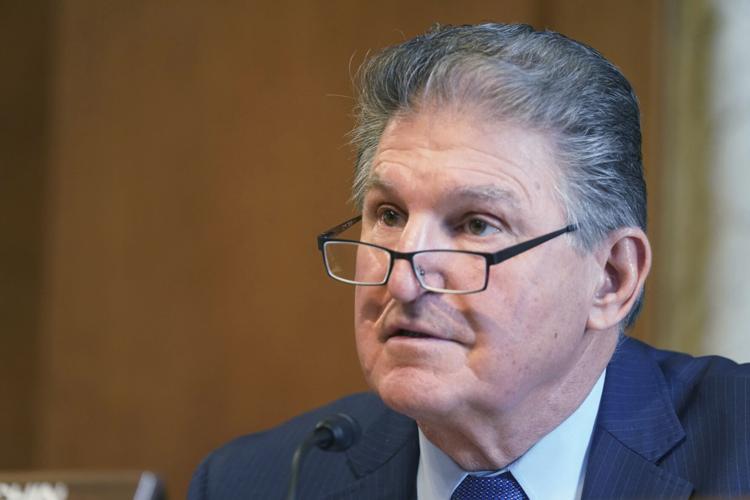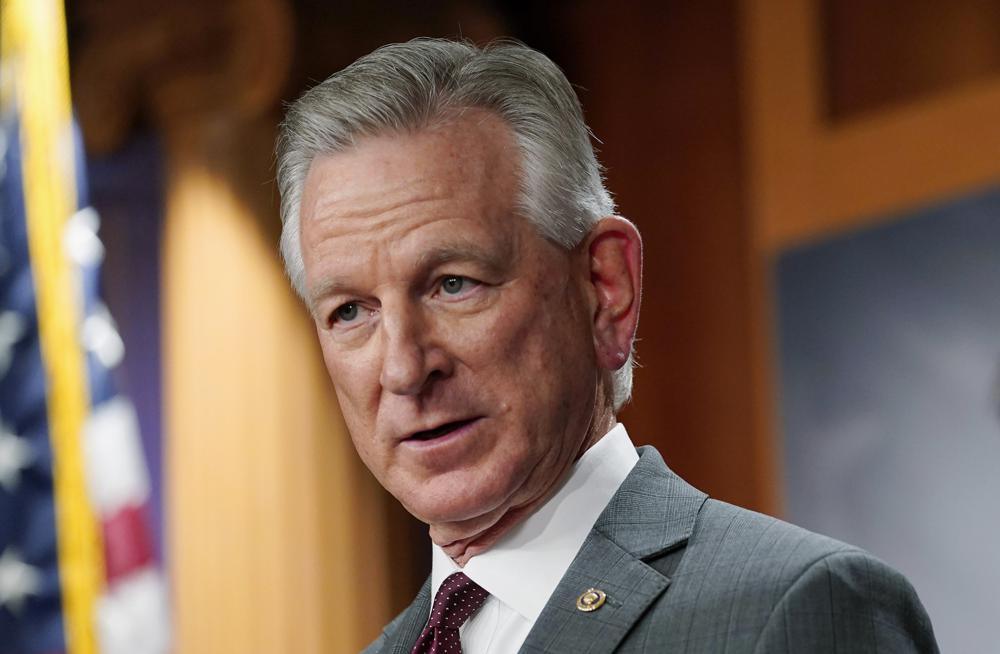Tommy Tuberville is concerned about farm policy

U.S. Senator Tommy Tuberville (R-Alabama) recently expressed concerns about farmers being unable to access disaster relief dollars. Specifically, Sen. Tuberville is concerned that the United States Department of Agriculture (USDA) is discriminating against larger farms in the disaster relief that farmers receive. “I am continuing my effort to protect Alabama farmers,” Sen. Tuberville told Alabama reporters during a press call. “Right now, a lot of Alabama farmers are frustrated by the way the Department of Agriculture, USDA, is giving out aid for emergency disaster relief for things like drought, hurricanes, and winter storms.” “The Biden Administration took a helpful relief program and absolutely ruined it,” said Tuberville. “The program’s rollout was extremely delayed, and the methodology and the implementation of the relief program is not equal for all farmers based on their losses. Right now, larger farms are getting only about ten to twenty-five percent of their losses back in relief from the Department of Agriculture. That leaves a lot of our farmers struggling to make ends meet.” Alabama farmers are being severely impacted by the severe drought that hit the state from August to November. While rains did break the drought conditions, they came after killing frosts, meaning that many farmers went into winter without adequate stockpiled grass and hay to feed cows through the winter. USDA does have the Livestock Forage Disaster Program. Farmers and ranchers affected by the drought should contact their local Farm Service Agency office for more details. The drought has also impacted orchards and winter grain farmers (winter wheat, rye, and oats). Given the dry conditions, many parts of the state were too dry for the seeds to establish themselves if the farmers even got the crop in. They either lost the crop or had to irrigate to get it established this winter – pumping water, if it was even available, is costly. “This week, I am joining Senator Roger Marshall (R-Kansas) and Senator John Hoeven (R-North Dakota) to go on record to tell the Department of Agriculture to get the woke ideology out of farm aid,” Sen. Tuberville continued. “Disaster relief is supposed to help farmers who need it, not hurt them. Congress has appropriated the money. The Department needs to use it to help all of our farmers to keep food on the table.” Sen. Tuberville is also concerned that a recent decision by USDA to allow fresh beef imports from Paraguay will be dangerous for food safety in the United States. Historically, beef from the South American nation has been barred due to the presence of foot and mouth disease there and the fear that it could spread to the United States. “The USDA also recently passed a rule to allow the importation of fresh beef from Paraguay,” Tuberville said. “This represents and presents concerns to the safety of our nation’s beef consumption as Paraguay does not have the same food and processing standards as the United States. Our biggest concern is foot and mouth disease entering the U.S. through these imports. Not only is it a safety risk, but it is a huge blow to America’s beef farmers.” In response to the USDA rule, Sens. Mike Rounds (R-South Dakota) and Jon Tester (D-Montana) introduced Senate Bill 3386 (S.3386) to temporarily suspend imports of beef and beef products from Paraguay and require the U.S. Department of Agriculture (USDA) to convene a working group to fully evaluate the threat that such imports would have on U.S. food safety and animal health. Beef imports from Paraguay are expected to hit grocery store shelves beginning December 14, 2023. Foot and mouth disease is a highly contagious disease of cloven-hoofed animals like cattle. The USDA estimates that an outbreak in the United States would result in losses over a 15-year period of between $37 billion to $42 billion. The last known FMD outbreak in Paraguay occurred in 2011. “We are grateful for this bipartisan action to protect our food supply and animal health from what we view as an extremely irresponsible decision by the USDA,” said R-CALF USA CEO Bill Bullard. “But Congress will have to act quickly to pass this legislation in time to prevent the importation of potentially high-risk beef from Paraguay given that the USDA wants to allow such beef imports to begin as early as December 14.” “The USDA needs to start putting our farmers first, not last,” Tuberville concluded. To connect with the author of this story or to comment, email brandonmreporter@gmail.com.
Mike Rounds, Joe Manchin seek back pay for military officers affected by Tommy Tuberville holds

by South Dakota Searchlight staff, Alabama Reflector This story was originally published on South Dakota Searchlight. Senators from South Dakota and West Virginia want hundreds of military officers to receive back pay after an Alabama senator held up their promotions for most of the year. Mike Rounds, a South Dakota Republican, and Joe Manchin, a West Virginia Democrat, announced Friday the introduction of the Military Personnel Confirmation Restoration Act of 2023. The bill comes after Sen. Tommy Tuberville, R-Alabama, ended holds he had placed on hundreds of military promotions in protest of a Pentagon abortion policy. The policy allows armed services members time off and travel reimbursement if they seek an abortion in a state where it remains legal. On Tuesday, Tuberville said he would lift all of his holds except for a handful of four-star general nominees. The men and women who wear the uniform of the United States of America should not be negatively impacted by political squabbles. – Sen. Mike Rounds, R-South Dakota Rounds said Friday in a news release that he, like Tuberville, disagrees with the Pentagon policy and supports “a member of the Senate’s right to hold any nomination.” But, Rounds added, “the men and women who wear the uniform of the United States of America should not be negatively impacted by political squabbles.” “I am pleased to introduce this bipartisan legislation with Senator Manchin to do the right thing and provide military officers and their families with the benefits they have earned for their decades of service and sacrifice,” Rounds said. The press release from Rounds included comments from Manchin, who focused on the affected service members and did not address the abortion policy or the right of senators to hold up nominations. “These men and women are true American heroes and the least we can do in Congress is restore the benefits they have earned and deserve,” Manchin said. The bill co-sponsors include Tuberville. Other co-sponsors are Angus King, I-Maine; Joni Ernst, R-Iowa; Kirsten Gillibrand, D-New York; Richard Blumenthal, D-Connecticut; and Tim Kaine, D-Virginia. South Dakota Searchlight is part of States Newsroom, a network of news bureaus supported by grants and a coalition of donors as a 501c(3) public charity. South Dakota Searchlight maintains editorial independence. Follow South Dakota Searchlight on Facebook and Twitter. Alabama Reflector is part of States Newsroom, a network of news bureaus supported by grants and a coalition of donors as a 501c(3) public charity. Alabama Reflector maintains editorial independence. Follow Alabama Reflector on Facebook and Twitter.
Katie Britt leads legislation to limit federal oversight into state-regulated insurance industry

On Tuesday, U.S. Senator Katie Britt (R-Alabama) led 16 of her Senate colleagues in introducing the Insurance Data Protection Act. This legislation would overrule a recent effort by the Federal Insurance Office (FIO) to step into the state-regulated insurance industry, including its proposed “Climate-Related Financial Risk Data Collection.” Britt said that the bill would eliminate the FIO Director’s subpoena authority. For over a century, the insurance industry was regulated by the states. That changed somewhat when the FIO was created in the Dodd-Frank Wall Street Reform and Consumer Protection Act. That Obama-era legislation does include an explicit provision stating that the Office does not have general supervisory or regulatory authority over the insurance business, which is supervised and regulated on a state-by-state basis across the United States. Senator Britt’s legislation clarifies that FIO does not need subpoena power since it is intended to function as an informational body. The bill would also require that the FIO coordinate any data collection efforts with state insurance regulators and assess all publicly available data and sources regarding the data being sought. These provisions would limit unnecessary data inquiries and prevent duplicative efforts across the state and federal landscapes. The bill would also set forth confidentiality procedures and requirements governing how data can be used by financial regulators if collected from insurers. This would ensure consumers’ information remains secure. “Our state insurance regulators have more than proven their ability to effectively and responsibly supervise the American insurance industry for over a century,” said Senator Britt. “FIO should work with, not around, state insurance officials. Not only is FIO overstepping its lawful authority and trampling on Congressional intent, but the office is also utilizing private insurance data to advance the Biden Administration’s leftwing Green New Deal agenda. This commonsense legislation would ensure the state-regulated insurance market remains strong, prevent redundant and unnecessary data reporting that would needlessly cost millions of dollars, and protect consumers’ sensitive information.” This legislation has been cosponsored by Senate Banking Committee Ranking Member Tim Scott (R-South Carolina). “As a former insurance agent, I know firsthand the importance of our state-based insurance regulation regime that has resulted in highly competitive and fair markets across the country – addressing local issues with local solutions,” said Sen. Scott. “That’s why I’ve been alarmed by the Federal Insurance Office’s (FIO) efforts to overstep its authority and push the Biden administration’s radical climate agenda. This important bill will reign in the administration’s climate activists, ensure greater coordination between FIO and state insurance regulators, and protect both consumers’ and insurers’ data.” Senators Marsha Blackburn (R-Tennessee), John Boozman (R-Arkansas), Ted Budd (R-North Carolina), Tom Cotton (R-Arkansas), Kevin Cramer (R-North Dakota), Mike Crapo (R-Idaho), Steve Daines (R-Montana), Bill Hagerty (R-Tennessee), John Kennedy (R-Louisiana), Cynthia Lummis (R-Wyoming), Pete Ricketts (R-Nebraska), Mike Rounds (R-South Dakota), John Thune (R-South Dakota), Thom Tillis (R-North Carolina), and J.D. Vance (R-Ohio) have all signed on to cosponsor the legislation. The National Association of Mutual Insurance Companies (NAMIC), American Property Casualty Insurance Association (APCIA), Association for Independent Agents (Big I), and Professional Insurance Agents (PIA) have endorsed this legislation. FIO is an office within the Treasury Department created by Dodd-Frank to monitor the insurance sector and help provide information to policymakers and state regulators, as needed, without regulatory authority. The climate risk assessments the FIO is collecting were requested in the President’s climate executive order and would require over 200 private insurance companies (over 70% of the homeowners’ insurance market) to provide to FIO highly-detailed data (broken down by zip code) regarding the effect of climate-related catastrophes on insurance availability and affordability for Americans. On November 1st, the Treasury announced its intention to move ahead with this data call. “Americans are facing growing challenges from extreme weather events caused by climate change,” Treasury Secretary Janet Yellen said in a statement about the FIO collection project. “The resulting data and analyses will help policymakers inform potential approaches to improving insurance availability and affordability for consumers.” While federal officials continue pushing for more detailed climate data from insurers, the National Association of Insurance Commissioners (NAIC) emphasizes climate concerns during its annual fall meeting. The Climate and Resiliency Task Force is expected to adopt a National Climate Resilience Strategy for Insurance to stabilize the insurance market. “It’s part of our overarching mission to manage risks, ensure the availability and reliability of insurance products, promote insurer solvency, and close protection gaps,” the strategy reads. “Our work to identify, assess, and communicate risk and risk reduction solutions, as well as to improve oversight of the insurance sector, has positioned state insurance regulators to implement a climate resilience strategy.” Katie Britt is a member of the Senate Committee on Banking, Housing, and Urban Affairs. To connect with the author of this story or to comment, email brandonmreporter@gmail.com.
Tommy Tuberville joins Republicans urging Defense Department to halt sales of border wall materials

On Tuesday, U.S. Senator Tommy Tuberville (R-Alabama) joined U.S. Sen. Roger Wicker (R-Mississippi), the ranking member of the Senate Armed Services Committee, and all the Republican members of the Senate Armed Services Committee, in a letter to the Department of Defense to halt the sale of border wall construction materials. The letter, addressed to Secretary of Defense Lloyd Austin, was in response to reports that the Defense Department was moving quickly to dispose of the unused border wall materials before the provisions of Wicker’s FINISH It Act could be implemented. “We are deeply disappointed to learn that rather than using construction materials that were purchased to secure the southwest border for that purpose, the Department of Defense has begun auctioning these materials off for other purposes,” the senators wrote. “These auctions represent a brazen attempt to circumvent the FINISH IT Act, which was included in both the House and Senate FY2024 National Defense Authorization Act.” As ranking member of the Armed Services Committee, Wicker worked with Republicans to insert the legislation, which would force the administration to allow the materials to be used to complete sections of the southern border wall, in this year’s National Defense Authorization Act (NDAA). The NDAA passed the Senate with a broad bipartisan majority and the provisions of the FINISH It Act were also included in the House-passed version of the NDAA. However, Congress has not passed the final conference committee version of the NDAA. The Senators believe Austin and the Defense Department are taking the opportunity to auction all the unused border wall materials for scrap metal while Congress is still on its August recess. The Senators are calling to halt further auctions of border wall materials and requesting detailed information on the current sales. The letter calls for the administration to direct the Department of Defense Inspector General to investigate Assistant Secretary of Defense for Homeland Defense and Hemispheric Affairs Melissa Dalton for her failure to provide Congress with accurate and timely information about the use of these border wall construction materials. The Senate Armed Services Committee Republicans have pledged to never consent to a confirmation hearing for the nominee for Under Secretary of Defense for Policy until the senators’ concerns are addressed. The DOD’s combat support branch, the Defense Logistics Agency (DLA), confirmed to reporters with Power Corridor last week that the Pentagon is now moving ahead with the sale of the leftover materials, many of which have been sitting for years in piles on government and private land out West. The items up for auction this week are “excess border wall materials that the U.S. Army Corps of Engineers turned over to the DLA for disposition and are now for sale,” a DLA spokesperson said. Leading the liquidation is Gov Planet, an online auction marketplace run by publicly traded Canadian company Ritchie Bros. Auctioneers. This week, Gov Planet began posting photos on its website and social media of large sections of the unbuilt wall, understood to be worth hundreds of millions of dollars. Sens. Tuberville and Wicker were joined by Sens. Deb Fischer (R-Nebraska), Tom Cotton (R-Arkansas), Mike Rounds (R-South Dakota), Joni Ernst (R-Iowa), Dan Sullivan (R-Alaska), Kevin Cramer (R-North Dakota), Rick Scott (R-Florida), Markwayne Mullin (R-Oklahoma), Ted Budd (R-North Carolina), and Eric Schmitt (R-Missouri). Tuberville stated that he supports common-sense policies that strengthen our border and national security, like building the wall and reinstating the Migrant Protection Protocols, also known as the Remain in Mexico policy. Senator Tuberville has spoken about his concerns on the floor of the U.S. Senate and called on the Biden administration to act. Tuberville has made multiple visits to the southern border to bring attention to the border situation. To connect with the author of this story or to comment, email brandonmreporter@gmail.com.
Katie Britt and colleagues pass legislation preventing adversarial nations from buying American farmland

U.S. Senator Katie Britt (R-Alabama) recently joined her colleagues in passing the bipartisan, bicameral Promoting Agriculture Safeguards and Security (PASS) Act. This legislation aims to prevent China, Russia, Iran, and North Korea from investing in, purchasing, leasing, or otherwise acquiring U.S. farmland. The bill was introduced by Senator Mike Rounds (R-South Dakota) and is cosponsored by Senator Britt and nine of her Senate colleagues. Companion legislation was introduced in the U.S. House of Representatives by U.S. Representative Elise Stefanik (R-New York). The PASS Act would add the Secretary of Agriculture as a standing member of the Committee on Foreign Investment in the United States (CFIUS) to consider agricultural needs when making national security determinations. Additionally, it would require a CFIUS review of agricultural land and business transactions by foreign individuals or entities and would also direct the President to prohibit any agricultural land transaction in the U.S. made by a foreign adversary. “I believe that one acre of American farmland owned by our adversaries is one acre too many,” said Senator Britt. “I’m proud to cosponsor this legislation and grateful for Senator Rounds’ leadership on this critical issue. Food security is national security, and we must prevent threats to the U.S. agricultural community that feeds and clothes our state, nation, and world. I’ll always fight to defend hardworking Americans while protecting our homeland.” “China and Russia are our near-peer adversaries, and North Korea and Iran are no friends of the United States,” said Sen. Rounds. “These four adversaries view America as their top competitor and only wish to gain advantage and opportunities to surveil our nation’s capabilities and resources. This commonsense provision will make our homeland more secure. I am pleased this amendment was included in this year’s NDAA, and I look forward to working with my colleagues to move this legislation across the finish line.” Earlier this year, Senator Britt participated in a Senate Committee on Banking, Housing, and Urban Affairs hearing where she questioned Clay Lowery, the former chairman of CFIUS, who affirmed that the Secretary of Agriculture should likely be involved in CFIUS in “a systematic way.” This legislation is similar to the Foreign Adversary Risk Management (FARM) Act, which was introduced by Sen. Tommy Tuberville (R-Alabama). Britt also cosponsored the FARM Act. “Over the past few years, we’ve seen an alarming increase in foreign purchases of farmland and food companies, particularly by China,” said Sen. Tuberville. “These foreign investments are now reaching every piece of the very large puzzle that makes up our agriculture industry, from farming and processing, to packaging and shipping. That’s why America’s agriculture community needs to have a permanent seat at the table when our government vets foreign investment in our country. Adding all parts of the agricultural supply chain to the list of transactions reviewed by CFIUS is the first step toward ensuring America’s agricultural suppliers can keep food on tables across the country.” Additionally, Britt introduced the Not One More Inch or Acre Act with Sen. Tom Cotton (R-Arkansas). That legislation would prevent any Chinese national or entity from owning American land. The PASS Act was passed as part of the Senate’s Fiscal Year 2024 National Defense Authorization Act (NDAA). Katie Britt is the ranking member of the Homeland Security Subcommittee of the Senate Committee on Appropriations. She was elected to the Senate in 2022. To connect with the author of this story or to comment, email brandonmreporter@gmail.com
Sen. Katie Britt joins colleagues in introducing bicameral bill to protect American businesses from SEC overreach

U.S. Senator Katie Britt (R-Alabama) joined Sen. Mike Rounds (R-South Dakota) and eight of their Senate colleagues in reintroducing legislation to only allow the U.S. Securities and Exchange Commission (SEC) to impose future disclosure requirements on publicly traded companies if the information is important for investors’ decisions. “If this Administration continues to try and enforce its radical Green New Deal policies on every corner of America, this reckless, partisan overreach is going to result in fewer American jobs, higher inflation, and more competitive advantages for foreign competitors in the marketplace,” said Sen. Britt. “American companies should not be held hostage by unelected bureaucrats. I’m proud to support this commonsense legislation that would uphold fiscal sanity and free-market values in our economy.” “The heavy hand of government is hampering the growth of our businesses and economy,” said Sen. Rounds. “This legislation would seek to depoliticize the SEC by preventing the agency from requiring reporting of unnecessary information and instead focus on protecting investors, maintaining fair and efficient markets and facilitating capital formation.” In March 2022, the SEC issued a rule requiring any public company to disclose its direct and indirect greenhouse gas emissions, including reporting by downstream suppliers like farmers and ranchers, even if that information is not relevant to investors. This rule would potentially limit access to capital, discourage new companies from going public and result in onerous reporting requirements that will be borne by farmers and small businesses. The Mandatory Materiality Requirement Act would refocus future SEC disclosure requirements on what is important: the information investors need to make smart investment decisions. Specifically, it would amend both the Securities Act of 1933 and the Securities Exchange Act of 1934 by inserting statutory language directly into both acts saying an “issuer is only required to disclose information in response to disclosure obligation adopted by the Commission to the extent the issuer has determined that such information is important with respect to a voting or investment decision regarding such issuer.” Sens. Britt and Rounds were joined by Sens. Thom Tillis (R-North Carolina), Bill Hagerty (R-Tennessee), Cynthia Lummis (R-Wyoming), Steve Daines (R-Montana), Chuck Grassley (R-Iowa), John Boozman (R-Arkansas), Kevin Cramer (R-North Dakota), and Dan Sullivan (R-Alaska) in introducing this legislation. SEC chair Gary Gensler advanced the SEC rule. Gensler has advocated for the SEC to consider climate-related and social issues in its regulatory policy since he took office in 2021. Gensler said climate reporting rules are a concern for investors and fit in with a tradition of disclosure requirements dating back to the Great Depression. Katie Britt was elected to the Senate in 2022. To connect with the author of this story or to comment, email brandonmreporter@gmail.com.
Katie Britt and colleagues introduce bill to allow consumers improve their credit ratings

U.S. Senator Katie Britt joined Sen. Tim Scott (R-South Carolina) in introducing the Credit Access and Inclusion Act to responsibly expand credit access for millions of Americans with limited or non-existent credit histories. The sponsors said that this bipartisan legislation would permit property owners and utility and telecom providers to report payment data to credit reporting agencies, allowing consumers with an established track record of paying their bills on time the additional opportunity to develop a positive credit history. “Hardworking Alabamians and Americans who have demonstrated financial responsibility deserve a pathway to establish and build their credit,” said Sen. Britt. “This bill takes into consideration the varying circumstances and experiences of individuals who hope to achieve their American Dream. Credit reporting is a crucial component in our nation’s economy to establish financial stability for the individual and the lender – this legislation simply incorporates a complete history of on-time payments, like rent and utilities, to reflect an accurate credit score.” “If you pay your bills on time, your credit score should reflect it,” stated Scott. “Americans shouldn’t be held back from purchasing a home, financing their education, or pursuing their dreams simply because their on-time payments don’t happen to count towards their credit scores. This bill will remove needless barriers and help hardworking Americans gain access to credit.” Sens. Britt and Ranking Member Scott in cosponsoring the bill are Senators Joe Manchin (D- West Virginia), Tom Cotton (R-Arkansas), Angus King (I-Maine), Mike Rounds (R-South Dakota), and Cynthia Lummis (R-Wyoming). U.S. Congressman French Hill (R-Arkansas) introduced the bill in the U.S. House of Representatives last week, along with Reps. Tom Emmer (R-Minnesota), David Schweikert (R-Arizona), Michelle Steel (R-California), Young Kim (R-California), Maria Elvira Salazar (R-Florida), and Byron Donalds (R-Florida). According to information provided by Sens. Britt and Scott, approximately 26 million Americans are “credit invisible,” meaning they lack credit records or a history of traditional payments, such as student loans, car loans, or mortgage payments. Having no credit or thin credit makes economic mobility difficult and hampers an individual’s ability to purchase a home, take out student loans, buy a car, or even get a job. The Credit Access and Inclusion Act allows credit bureaus to collect payment data for services not traditionally factored into credit reporting, such as rent, internet, phone, electricity, and utility payments. Factoring these payments into credit reporting would expand credit histories and generate credit scores for consumers who were previously “unscorable.” Many Americans who don’t have credit cards, mortgages, car payments, etc., don’t have enough open accounts to generate a credit score. Some people, however, are just starting out in life, while some people with no credit accounts may have significant actual wealth. Katie Britt is a member of the Senate Committee on Banking, Housing, and Urban Affairs. To connect with the author of this story or to comment, email brandonmreporter@gmail.com.
Katies Britt joins bipartisan group of colleagues questioning Federal Reserve’s actions in Silicon Valley Bank crisis

On Monday, U.S. Senator Katie Britt joined Senators Kyrsten Sinema, Thom Tillis, and a bipartisan group of Senators questioning the Federal Reserve its’ oversight of troubled Silicon Valley Bank before the bank’s failure. The Sens. claim that the Federal Reserve missed clear warning signs – including bank leadership’s failure to appropriately manage customer deposits. That it missed as part of its responsibilities to conduct oversight and examinations ahead of Silicon Valley Bank’s collapse. “SVB is a clear case of regulators refusing to do their job despite the fact that all of the red flags were there,” said Sen. Britt. “The Fed failed to use the tools in their toolbox to prevent what we saw in recent weeks, and I want to know why. Alabamians don’t just want answers, they deserve answers. And I, for one, will not stop until we get them.” “It is gravely concerning that retail participants, utilizing only publicly available information, were able to identify clear and compelling examples of financial mismanagement and asset over-concentration at SVB, while the Fed, which can draw even deeper from non-public supervisory information, was unable to ascertain a similar conclusion,” the Sens. wrote in their letter. “The fact that the San Francisco Fed, among other regulatory agencies, found no reason to take appropriate regulatory action or even investigate SVB further in the months, weeks, and days prior to the bank’s collapse must be addressed in a manner that restores public confidence in Fed supervision.” “Safety and soundness is the cornerstone regulatory principle of the U.S. banking system, and it is important we assess what went wrong at SVB to ensure future stability in the U.S. financial services sector. Specifically, we support any efforts that will provide further information on all relevant risks, actions, and inactions – taken by SVB and by regulators, supervisors, and examiners – that contributed to this failure,” the Sens. wrote. “It is gravely concerning that retail participants, utilizing only publicly available information, were able to identify clear and compelling examples of financial mismanagement and asset over-concentration at SVB, while the Fed, which can draw even deeper from non-public supervisory information, was unable to ascertain a similar conclusion. The fact that the San Francisco Fed, among other regulatory agencies, found no reason to take appropriate regulatory action or even investigate SVB further in the months, weeks, and days prior to the bank’s collapse must be addressed in a manner that restores public confidence in Fed supervision. We look forward to evaluating the results of your review, particularly with respect to the robustness of Fed supervision and examination of SVB.” Britt joined Sinema and Tillis in cosigning the letter. Also cosigning were Sens. John Hickenlooper (D-Colorado), Kevin Cramer (R-North Dakota), Chris Murphy (D-Connecticut), Mike Rounds (R-South Dakota), Cynthia Lummis (R-Wyoming), Bill Hagerty (R-Tennessee), Catherine Cortez Masto (D-Nevada), J.D. Vance (R-Ohio), and Michael Bennet (D-Colorado). There are media reports that federal regulators knew about the problems at SVB for more than a year, and yet they hesitated to act. The Wall Street Journal reported that federal bank regulators knew Silicon Valley Bank was a troubled bank as early as 2019. In 2021, the Federal Reserve cautioned the bank about significant vulnerabilities in the bank’s containment of risk. SVB had a uniquely concentrated customer base of venture capital funds, venture investors, and start-ups, many of whom have or have had financial relationships or business partnerships with one another. That customer base includes a significant level of financial interdependency that potentially increased risk. The Fed identified the risks to the bank, yet SVB did nothing to mitigate any of the risks. The Federal Reserve has already announced an internal investigation into its regulatory oversight, supervision, and examination of Silicon Valley Bank. The Senators urged that as part of this investigation, the Fed should focus on the role of concentration risk in the bank examination process and review the financial arrangements between Silicon Valley Bank and its customers to determine their impact on the bank’s collapse. Katie Britt is a member of the Financial Institutions and Consumer Protection Subcommittee of the Senate Committee on Banking, Housing, and Urban Affairs. To connect with the author of this story or to comment, email brandonmreporter@gmail.com.
Tommy Tuberville welcomes Nikki Haley to 2024 presidential race

On Monday, former South Carolina Governor and UN ambassador Nikki Haley announced her candidacy for the Republican nomination for President of the United States. U.S. Senator Tommy Tuberville, who has already announced his endorsement of former President Donald Trump, welcomed Haley’s entrance into the 2024 presidential race. Tuberville told reporters that she would be a “great candidate.” Tuberville favors a large GOP primary field and said that he has recently spoken with Trump and told the former President that he hopes “they all get in.” “He needs the challenge as well as anybody,” Tuberville said. “They need to work for it. They need to fight for it.” In the 2020 election, President Trump endorsed Tuberville in his Republican primary battle for U.S. Senate with former Trump Attorney General Sen. Jeff Sessions. Tuberville had spent forty years as a teacher and coach – including stints as head football coach at Ole Miss, Auburn, Texas Tech, and Cincinnati – prior to that 2020 first run for public office. At this point, the only announced GOP candidates for the Republican nomination for 2024 are Haley and Trump, but that is expected to change quickly. Florida Gov. Ron DeSantis, former Vice President Mike Pence, and former Secretary of State Mike Pompeo are widely believed to be seriously looking at entering the race. According to the Hill, former Arkansas Gov. Asa Hutchinson, New Hampshire Gov. John Sununu, former Maryland Gov. Larry Hogan, U.S. Sen. Rick Scott, and Virginia Gov. Glenn Youngkin are also possible presidential candidates. GOP Senators who oppose a third Trump presidential run fear that a crowded GOP primary field makes it easier for Trump to emerge as the eventual GOP nominee. “Look, we were all concerned with the fact that we had 15 or 16 or 17 individuals vying for attention in the last one,” said Sen. Mike Rounds (South Dakota) told the Hill referring to the 2016 election. “We really don’t want to see that happen again. We just don’t.” U.S. Sen. Katie Britt was endorsed by Trump in her 2022 GOP primary battle with then-Congressman Mo Brooks and war veteran and defense contractor Mike Durant. Britt, however, cannot make an endorsement in the Presidential primary because she is serving on the national Republican steering committee. Trump faced a crowded field in 2016 that included U.S. Sens. Ted Cruz, Marco Rubio, Rand Paul, Rick Santorum, and Lindsey Graham, as well as former Florida Gov. Jeb Bush, former Ohio Governor John Kasich, former Arkansas Gov. Mike Huckabee, then-New Jersey Gov. Chris Christie, businesswoman Carly Fiorina, former Virginia Gov. Mike Gilmore, former New York Gov. George Pataki, then Louisiana Gov. Bobby Jindal, and Dr. Ben Carson. Trump won the 2016 Alabama Republican Primary despite the crowded field. Trump went on to win the Republican nomination and then beat former Secretary of State Hillary Clinton in the general election. Trump was unseated by former Vice President Joe Biden in 2020. Biden appears to be virtually unopposed at this point for the 2024 Democratic nomination for President. The 2024 Alabama Republican Primary is only 55 weeks away on March 5. DeSantis will speak to the Alabama Republican Party in Birmingham on March 9. To connect with the author of this story, or to comment, email brandonmreporter@gmail.com.
Katie Britt believes Alabama taxpayers do not want taxes paying for elective abortions

United States Senators Katie Britt and Roger Wicker joined 45 other Senators in introducing the No Taxpayer Funding for Abortion Act. This legislation would establish a single, government-wide standard to permanently prohibit the flow of federal funding for abortion. “The vast majority of Alabamians do not want their hard-earned dollars funding elective abortions in California and New York,” Britt stated. “The Hyde Amendment has saved an estimated 2.5 million lives – approximately half the population of Alabama,” said Sen. Britt. “Sadly, radicals in the Democratic Party continue to trumpet their calls for abortion at any time, for any reason. They have now targeted the long-standing, bipartisan Hyde Amendment, annually passed by Congress since 1976, which ensures federal taxpayer dollars are not used to fund abortions. It is time to make the Hyde Amendment and its lifesaving protections permanent so the far-left does not attempt to hold the nation hostage every year. The vast majority of Alabamians do not want their hard-earned dollars funding elective abortions in California or New York. I will continue to fight to defend life, support parents, grow opportunities for hardworking families, and preserve the American Dream for our children and our children’s children.” “Most Americans do not want their hard-earned tax dollars being used for abortion-on-demand, but our current patchwork of regulations has brought years of uncertainty,” stated Sen. Wicker. “The No Taxpayer Funding for Abortion Act would simplify federal rules, ensuring that American tax dollars are never used for the destruction of innocent, unborn life.” This legislation would make permanent the restrictions on funding for elective abortion and elective abortion coverage, including the Hyde Amendment, which currently relies on yearly approval. It would also eliminate Obamacare’s taxpayer subsidies for elective abortion coverage on the Affordable Care Act exchanges through refundable tax credits. U.S. Sen. Tommy Tuberville (R-Alabama) also co-sponsored the legislation. “Millions of hardworking Americans believe that life begins at conception and don’t want their taxpayer dollars inadvertently funding abortions,” said Sen. Tuberville. “As a Christian and as a conservative, I share their belief that every life is sacred and every American has a right to life. That’s why I’m proud to sign on to this legislation that will solidify abortion funding restrictions that have been in place for decades and better protect the unborn.” Britt, Tuberville, and Wicker joined Sens. Mitch McConnell (R-Kentucky) John Barrasso (R-Wyoming), Marsha Blackburn (R-Tennessee), John Boozman (R-Arkansas), Mike Braun (R-Indiana), Ted Budd (R-North Carolina), Shelley Moore Capito (R-West Virginia), Bill Cassidy (R-Louisiana), John Cornyn (R-Texas), Tom Cotton (R-Arkansas), Kevin Cramer (R-North Dakota), Mike Crapo (R-Idaho), Ted Cruz (R-Texas), Steve Daines (R-Montana), Joni Ernst (R-Iowa), Deb Fischer (R-Nebraska), Lindsey Graham (R-South Carolina), Chuck Grassley (R-Iowa), Bill Hagerty (R-Tennessee), Josh Hawley (R-Missouri), John Hoeven (R-North Dakota), Cindy Hyde-Smith (R-Mississippi), Ron Johnson (R-Wisconsin), John Kennedy (R-Louisiana), James Lankford (R-Oklahoma), Mike Lee (R-Utah), Cynthia Lummis (R-Wyoming), Roger Marshall (R-Kansas), Jerry Moran (R-Kansas), Markwayne Mullin (R-Oklahoma), Rand Paul (R-Kentucky), Pete Ricketts (R-Nebraska), Jim Risch (R-Idaho), Mitt Romney (R-Utah), Mike Rounds (R-South Dakota), Marco Rubio (R-Florida), Eric Schmitt (R-Missouri), Rick Scott (R-Florida), Tim Scott (R-South Carolina), Dan Sullivan (R-Alaska), Thom Tillis, (R-North Carolina), John Thune (R-South Dakota), J.D. Vance (R-Ohio), and Todd Young (R-Indiana). With Democrats in control of the Senate, it is unlikely that Senate Majority Leader Chuck Schumer will allow this bill to even be introduced on the Senate floor. To connect with the author of this story or to comment, email brandonmreporter@gmail.com.
Tommy Tuberville supports bill to permanently ban taxpayer funding for abortions

U.S. Senators Tommy Tuberville and Katie Britt joined 45 of their Senate colleagues in introducing the No Taxpayer Funding for Abortion Act to establish a permanent prohibition on federal funding for abortion. Tuberville said in a statement, “Every life is sacred.” “Millions of hardworking Americans believe that life begins at conception and don’t want their taxpayer dollars inadvertently funding abortions,” said Sen. Tuberville stated. “As a Christian and as a conservative, I share their belief that every life is sacred and every American has a right to life. That’s why I’m proud to sign on to this legislation that will solidify abortion funding restrictions that have been in place for decades and better protect the unborn.” “Most Americans do not want their hard-earned tax dollars being used for abortion-on-demand, but our current patchwork of regulations has brought years of uncertainty,” Sen. Roger Wicker said. “The No Taxpayer Funding for Abortion Act would simplify federal rules, ensuring that American tax dollars are never used for the destruction of innocent, unborn life.” The bill seeks to change 40 years of inconsistent policies that have regulated federal funding for abortion. It would make funding restrictions permanent for abortion and elective abortion coverage, including the Hyde Amendment, which requires annual approval. The legislation would also eliminate taxpayer-funded subsidies for elective abortion coverage currently offered on Affordable Care Act exchanges through refundable tax credits. Tuberville, Wicker, and Britt joined Sens. Mitch McConnell (R-Kentucky) John Barrasso (R-Wyoming), Marsha Blackburn (R-Tennessee), John Boozman (R-Arkansas), Mike Braun (R-Indiana), Ted Budd (R-North Carolina), Shelley Moore Capito (R-West Virginia), Bill Cassidy (R-Louisiana), John Cornyn (R-Texas), Tom Cotton (R-Arkansas), Kevin Cramer (R-North Dakota), Mike Crapo (R-Idaho), Ted Cruz (R-Texas), Steve Daines (R-Montana), Joni Ernst (R-Iowa), Deb Fischer (R-Nebraska), Lindsey Graham (R-South Carolina), Chuck Grassley (R-Iowa), Bill Hagerty (R-Tennessee), Josh Hawley (R-Missouri), John Hoeven (R-North Dakota), Cindy Hyde-Smith (R-Mississippi), Ron Johnson (R-Wisconsin), John Kennedy (R-Louisiana), James Lankford (R-Oklahoma), Mike Lee (R-Utah), Cynthia Lummis (R-Wyoming), Roger Marshall (R-Kansas), Jerry Moran (R-Kansas), Markwayne Mullin (R-Oklahoma), Rand Paul (R-Kentucky), Pete Ricketts (R-Nebraska), Jim Risch (R-Idaho), Mitt Romney (R-Utah), Mike Rounds (R-South Dakota), Marco Rubio (R-Florida), Eric Schmitt (R-Missouri), Rick Scott (R-Florida), Tim Scott (R-South Carolina), Dan Sullivan (R-Alaska), Thom Tillis, (R-North Carolina), John Thune (R-South Dakota), J.D. Vance (R-Ohio), and Todd Young (R-Indiana). Swing Republican Sens. Lisa Murkowski and Susan Collins did not sign off on the legislation, and neither did any of the 52 Senate Democrats who hold the majority in the body. U.S. Representative Christopher Smith (R-New Jersey) has introduced similar legislation in the House of Representatives. To connect with the author of this story, or to comment, email brandonmreporter@gmail.com.
Sen. Katie Britt votes against confirming Brendan Owens

On Monday, U.S. Senator Katie Britt today cast her first-ever vote in the Senate; when she voted against the confirmation of Brendan Owens to serve as Assistant Secretary for Energy, Installations, and Environment in the Department of Defense. Owens was originally nominated by President Joe Biden in March 2022 but failed to muster the support to get a floor vote during the 117th Congress. President Biden re-nominated Owens in January 2023 at the start of the 118th Congress. “The Biden Administration has consistently prioritized their reckless leftwing political agenda to the detriment of our military readiness,” said Sen. Britt. “This nominee would simply be the tip of the spear in continuing President Biden’s radical ‘Green New Deal’ priorities at the Department of Defense, which should be focused on ensuring our incredible men and women in uniform are the best equipped, resourced, and trained in the world. We achieve peace through strength, not wokeness. The last thing we need is a DOD appointee from the ESG movement.” The U.S. Senate confirmed Owens on Monday night with 60 “yea” and 35 “nay” votes. A number of Republicans voted to confirm Owens, including Sens. Shelley Moore Capito of West Virginia, Susan Collins of Maine, John Cornyn of Texas, Joni Ernst of Iowa, Lindsey Graham of South Carolina, Chuck Grassley of Iowa, Mitch McConnell of Kentucky, Jerry Moran of Kansas, Mitt Romney of Utah, Mike Rounds of South Dakota, Thom Tillis of North Carolina, Roger Wicker of Mississippi, and Todd Young of Indiana. Britt was elected in a landslide by the voters of Alabama in November after besting four rivals in the Alabama Republican Primary last spring. Senate is the first elected office she has ever held. Britt and her husband, Wesley, live in Montgomery with their two children. To connect with the author of this story, or to comment, email brandonmreporter@gmail.com.


